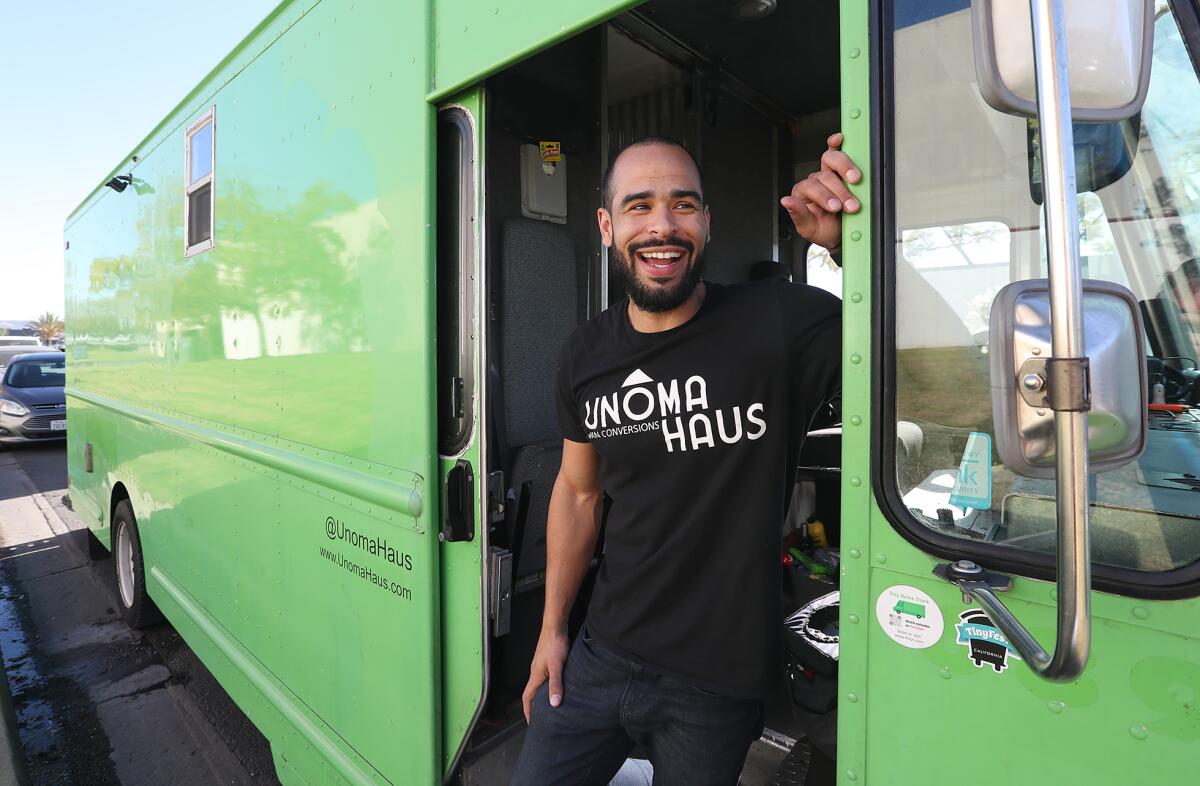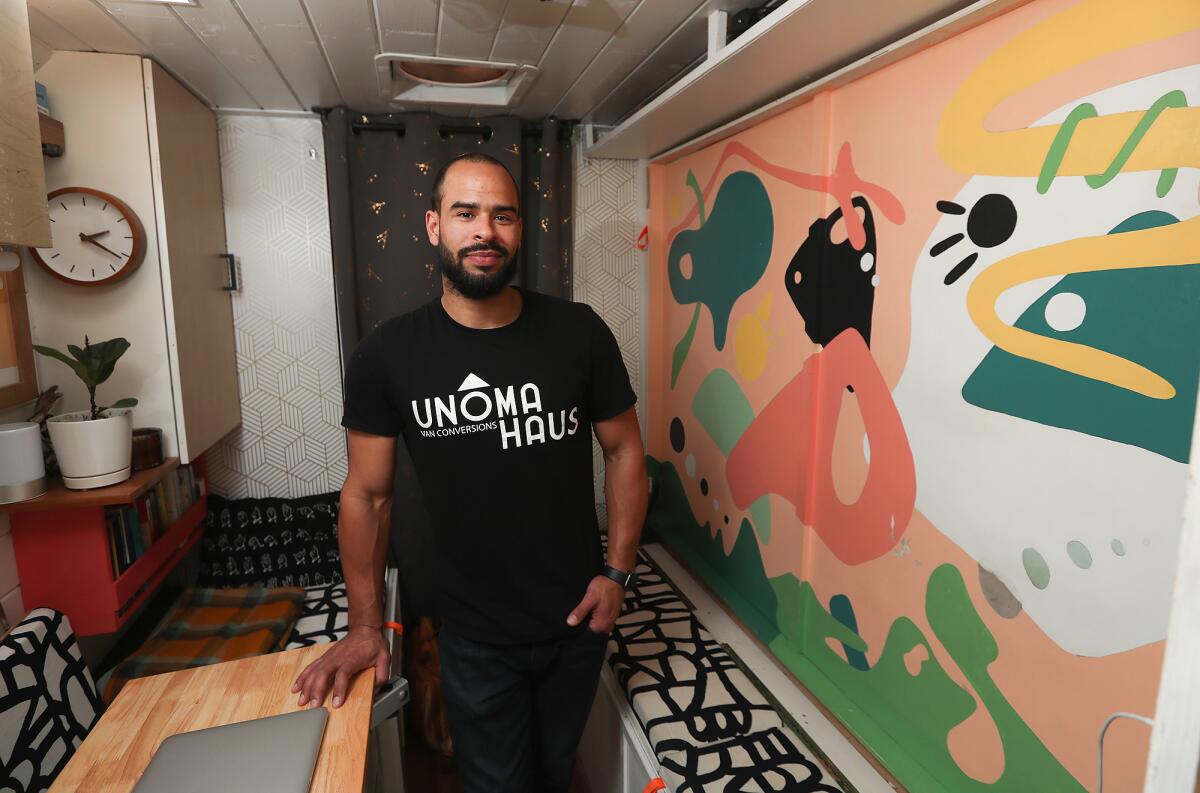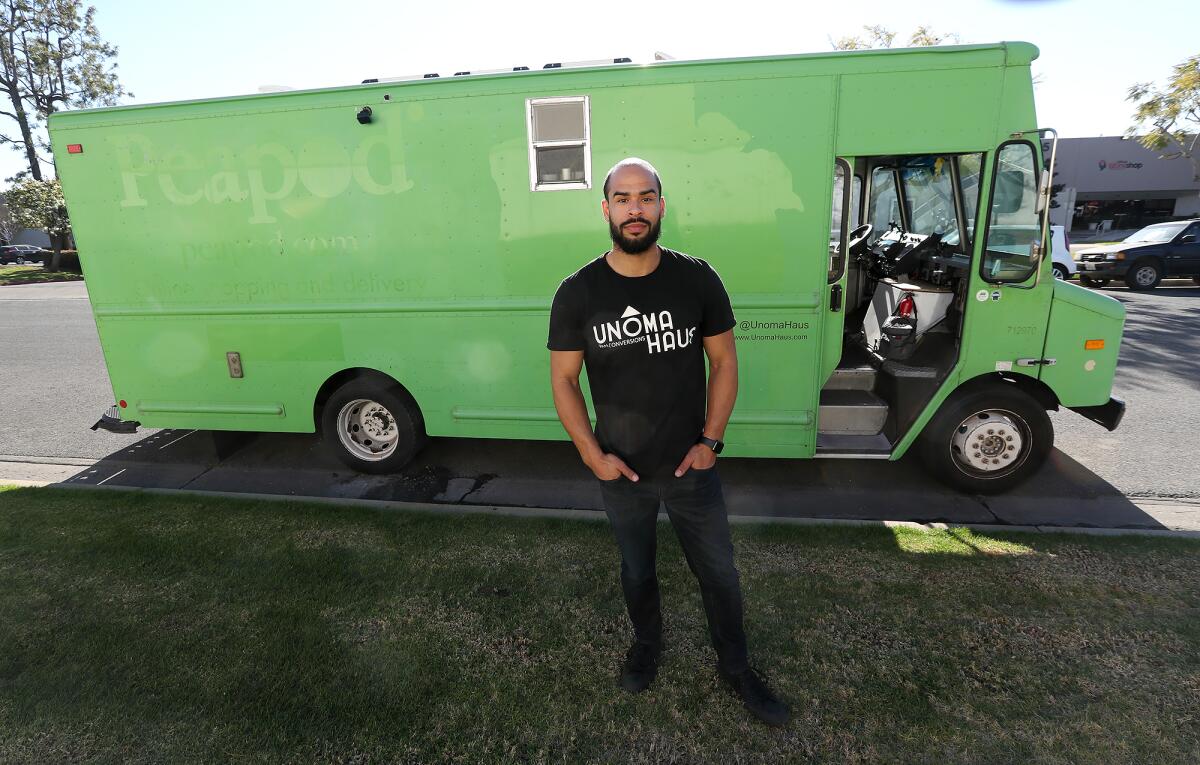‘Option C’: Costa Mesa’s Unoma Haus aims to house people in new ways

- Share via
Inside a green delivery truck, Vaughn Dabney has built a home. A working stove and sink line one side of the solar-powered truck. A closet opens to reveal a guitar. Two benches with stylish cushions make up a living room space. A bathroom complete with shower, toilet and a skylight is tucked behind one door, a Murphy bed behind another.
“It pulls out from the wall,” Dabney explains. “I just reduced it from an 8-inch mattress to a 6-inch mattress, but it’s still super comfortable.”
Dabney is the owner of Unoma Haus, the first Black-owned van conversion company based in Costa Mesa, and he hopes to make an impact on communities of color and others in need by providing alternative living options.
“Unoma Haus is a company building a network of community spaces that allow adventure seekers to experience an inclusive nomadic lifestyle,” Dabney said.
The name comes from two places. “Unoma” is Igbo, a language derived from Nigeria, that means “beautiful home,” and “Haus” is the German spelling for “home.” The name combines Dabney’s own heritage of West African and German roots.
Dabney’s journey to create Unoma Haus began in 2017 when he traveled the country for two months after ending his lease on his Los Angeles apartment. He traveled across 39 states, seeking connection.
“I had just finished authoring my first book,” said Dabney, “and I was connecting people through that book.”
The book, “Finding One,” explores the discovery of one’s self, and when Dabney returned to the Los Angeles area, he wasn’t interested in another lease. He decided to convert a delivery truck into a living space in order to live and travel. Dabney shared his entire van conversion process on his YouTube channel, “The Tiny Home Truck.” Once the truck was complete, he received inquires about helping others build their own to live in and to rent.

Dabney sees himself as an example that can model a lifestyle where people in communities of color might not have seen themselves in before.
“You need representation from someone who is familiar for any person to have the confidence and the hope that they can do it too,” said Dabney. “Doing what I am doing in my truck or with these vans is for that child that saw me on TV and now they see a delivery truck go by and they reframe how they look at that vehicle and say ‘Hey, that could be a home.’ ”
Dabney is a bit closer to building the community he envisions thanks to a grant from the Coalition to Back Black Businesses.
CBBB awarded $5,000 grants to 491 Black-owned small businesses this year, Unoma Haus among them. The coalition is a multiyear grant-making and mentorship initiative established by American Express and the U.S. Chamber of Commerce Foundation to address the needs of businesses impacted by the pandemic and support their long-term growth. Since its launch, CBBB has awarded over 1,000 grants to Black-owned small businesses.
“Regardless of the amount, any money helps scale to the next level, even if it is $500,” said Dabney. “So when I saw we had been chosen, I was elated because it really does help and it helps me push forward our mission in terms of representation, push forward our goals in terms of redefining what home means.”
In addition to the money, the grant also includes access to long-term mentorship and online resources. Dabney said he has used the support to help with labor costs, material costs and more.
“The growth has been incredible,” said Dabney, “especially for Black and brown people. There is not a whole of representation in this space.”

Dabney works out of Costa Mesa’s Urban Workplace and has converted six vans so far. But van conversions are only the first phase of his Unoma Haus vision, he said.
“Our first product offering is van conversions. Then we will move to shipping-container homes,” said Dabney. “Then we will build micro-communities where if you have one of our vans and you are traveling across the country, you can look up on our app, where you can park — a safe place to park.”
Dabney hopes to get the ball rolling on shipping-container homes this year.
“We are going to purchase our first container this year,” Dabney said. “And we are going to build out our first home. We are going to take some of the technology that we are using in our vans and put it into the container home, really utilizing off-grid resources.”
He also hopes Unoma Haus can one day provide home alternatives, like transient community living.
“I want people to have that freedom but also be inspired to not just subscribe to what we have been told is a home. It is not just an apartment, it is not just a house,” Dabney said. “There is an option C. And I am hoping to be that.”
All the latest on Orange County from Orange County.
Get our free TimesOC newsletter.
You may occasionally receive promotional content from the Daily Pilot.




